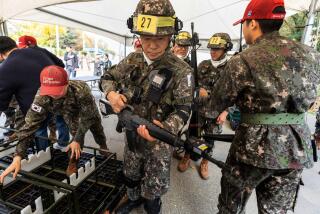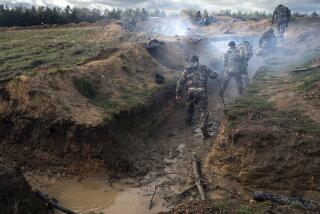U.S. pins hopes on Iraqi army to maintain gains in security
- Share via
MAHMOUDIYA, IRAQ — The 10 rows of men stood ramrod straight, their right hands saluting in unison, their left arms stiffly at their sides, save for one in a plaster cast and sling.
Then, in a burst of collective energy, they raced out the door, crossed a vast field and hurled themselves onto an obstacle course of swinging ropes, muddy ditches, catwalks and towering walls.
Welcome to the new Iraqi army, or at least a tiny portion of it that U.S. and Iraqi officials hope will serve as a model for the rest. The mid-December event was a graduation at the new Iraqi Army Commando Course, and it provided a look at the progress being made and the challenges still facing the 160,000-strong army.
On the plus side, 50 soldiers made the cut. On the minus side, 106 didn’t. Still, the pass rate was better than for four previous commando classes, which graduated about 35 each.
“We’re ready for anything. We’ll demolish the enemy with a big fist!” declared newly minted commando Ziad Khalaf Hamza, 20, an amber-eyed judo expert.
Perhaps no Iraqi institution faces greater scrutiny nowadays than the security forces, which the U.S. and British militaries are counting on to maintain recent gains officials have cited.
Britain last month signed over responsibility for security in Basra, the last of the four provinces under British control to be handed over to Iraqis. The U.S. military has begun pulling out the five extra combat brigades it deployed in Iraq last year, which will bring the American troop level to about 134,000 by the middle of the year, down from more than 160,000.
Yet relying on Iraqi security forces has proved risky. In February, when Army Gen. George W. Casey Jr. handed off command of U.S. troops in Iraq to Gen. David H. Petraeus, he predicted that Iraqi forces would be in charge of security nationwide by fall.
Casey’s time in Iraq was marked by a push to bring down the U.S. troop level and speed the transfer of responsibilities to the Iraqi government. But insurgents took advantage of the less experienced Iraqi forces to ramp up violence, which led President Bush to deploy the additional brigades.
Attacks on civilians and coalition forces have dropped to their lowest level in more than two years, according to Army Lt. Gen. Raymond T. Odierno, the day-to-day commander of U.S. troops in Iraq. Opinions vary, though, on how ready Iraqi troops are to take charge.
Iraqi government spokesman Ali Dabbagh said in December that Iraq would need foreign troops to defend it for a decade.
“Of course we need international support. We have security problems. For 10 years our army will not be able to defend Iraq,” Dabbagh told the state-run Al Iraqiya TV.
A Pentagon quarterly report to Congress released Dec. 18 says that 77% of Iraqi army units are considered capable of planning, executing and sustaining operations with little or no help from U.S. forces. But it says the army’s readiness is constrained by shortfalls in its ability to manage logistics, such as providing equipment. It also says a shortage of officers to take on leadership roles “remains problematic” and that it will “take years” to close the gap.
In testimony to Congress in September, Petraeus said training of the Iraqi army had been hampered by violence that kept too many troops on combat missions.
Brig. Gen. Ali Furaiji, commanding officer of the Iraqi army’s 4th Brigade, 6th Division, whose area of operation includes former insurgent strongholds south of Baghdad, agreed with that assessment.
“The thing is, our soldiers do not get much training because they’re always out on the streets,” said Furaiji, who served under Saddam Hussein for 20 years. “Back in the old army, we’d get up at 5 a.m., run [about three miles], train 13-hour days.”
However, Furaiji said the old military was not highly respected, because it was seen as a protector of Hussein rather than the Iraqi people.
That’s one reason for the Commando Course, aimed at instilling a sense of pride in young soldiers and putting them on the path to becoming officers.
“When he finds there is more respect for him, he’ll find he has better stamina,” Furaiji said after handing out framed diplomas, commando badges and watches to the latest graduates.
“This invests much more leadership skills at a lower level,” said Brig. Gen. James Yarbrough, commanding general of the Iraq Assistance Group, which advises the Iraqi military on training programs.
Troops chosen by commanding officers train for 12 hours a day for about three weeks. Most drop out quickly during the grueling physical tests, said Furaiji, a tall, elegant man who said that he could not make the grade himself. Asked why not, he held up a pack of Kent cigarettes. “Five a day,” he said.
The desire to become a commando is fierce, Furaiji said, recalling a young man who broke down and cried when he failed the physical test. The soldier begged for another chance. Furaiji gave it to him, and he passed. The man with the cast on his arm had broken it during the course but went on to gain his commando badge anyway.
Those who pass the endurance portion of the 23-day course move on to other specialties, most of which were not part of previous Iraqi army training: changing a Humvee tire under fire, for example, or first aid.
Yarbrough said the Iraqi military practice had been to transport wounded soldiers to the nearest civilian hospital. By comparison, each U.S. military platoon has a medic.
On the obstacle course, graduates showed off their skills to an audience of U.S. and Iraqi officers and journalists. They bellied under wires through muddy bogs, rappelled down walls, inched across ropes suspended about 40 feet in the air and pounded one another in a judo ring. The finale was a demonstration of house raiding and target shooting.
Afterward, Yarbrough said he had few worries about the dedication of soldiers such as judo expert Hamza, or Mohammed Ali Kamel, a boxer who also was among the newly graduated commandos.
“I want to protect my home, my country and the innocent people,” Kamel said.
The Iraqi army has not suffered from the sectarian troubles that have beset the national police force, which is overwhelmingly Shiite Muslim and infiltrated by militiamen.
Yarbrough said one of his main concerns with the army was improving its ability to manage logistics. “That’s proving a tough nut to crack,” he said, referring to such tasks as repairing damaged equipment. The difficulty is linked to the broader U.S. effort to force Iraqi officials to turn to their own government to fix things, instead of counting on American forces.
Ten new logistics centers, to be completed in May, are designed to speed up the transition by giving the Iraqi military a place to warehouse parts and equipment and to send hardware that needs repair.
“But as you map this out, it simply takes time,” Yarbrough said, noting that the military was being created from scratch after having been disbanded under a 2003 decree by the U.S. officials of the Coalition Provisional Authority that ran Iraq in the immediate aftermath of Hussein’s ouster.
Yarbrough, without criticizing that move, acknowledged the strain it had placed on U.S. and Iraqi forces. “I’d hope we would deliberate that decision in future conflicts very, very hard,” he said.
--
More to Read
Sign up for Essential California
The most important California stories and recommendations in your inbox every morning.
You may occasionally receive promotional content from the Los Angeles Times.











